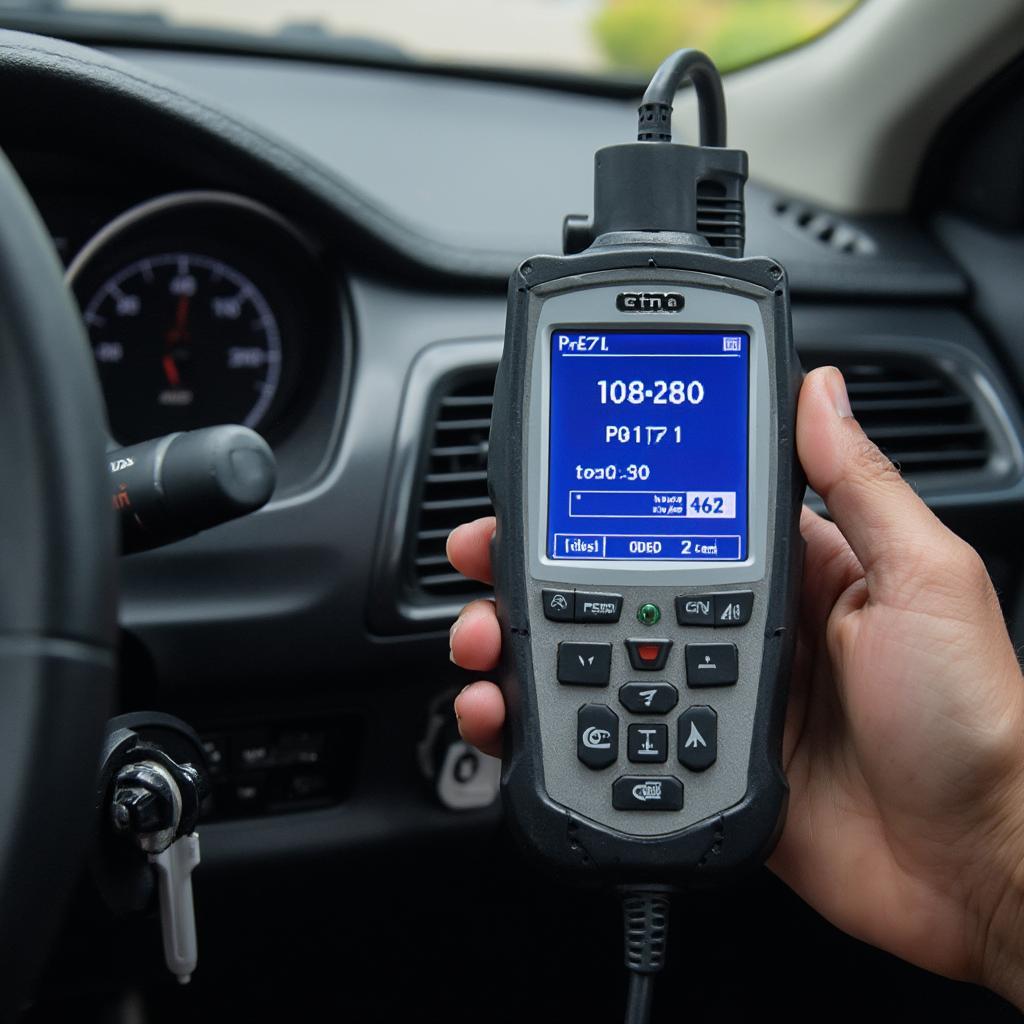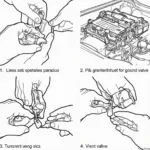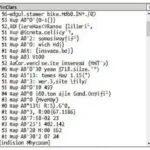The dreaded P0171 code. If you’re a Honda Accord owner, you may have encountered this OBD2 trouble code, which indicates a “System Too Lean (Bank 1).” This guide will delve deep into the P0171 code, specifically for Honda Accords, providing you with a comprehensive understanding of its causes, symptoms, diagnostic procedures, and solutions.
Understanding the OBD2 Code P0171
The P0171 code signifies that the air-fuel mixture in your engine’s Bank 1 is running lean. “Lean” means there’s too much air compared to fuel. While a slightly lean mixture can improve fuel economy, a significantly lean mixture, as indicated by the P0171 code, can lead to various performance issues and even engine damage. Bank 1 refers to the side of the engine containing cylinder number one.
Common Causes of P0171 in Honda Accords
Several factors can contribute to a P0171 code in a Honda Accord. These include:
- Vacuum Leaks: Perhaps the most common culprit, vacuum leaks allow unmetered air to enter the engine, disrupting the air-fuel ratio.
- Faulty Oxygen Sensor (O2 Sensor): The O2 sensor monitors the exhaust gases and provides feedback to the engine control unit (ECU) to adjust the air-fuel mixture. A malfunctioning sensor can lead to inaccurate readings and a lean condition.
- Mass Airflow Sensor (MAF Sensor) Issues: The MAF sensor measures the amount of air entering the engine. A dirty or faulty MAF sensor can provide incorrect data to the ECU, causing a lean mixture.
- Fuel Injector Problems: A clogged or leaking fuel injector can restrict fuel flow, leading to a lean condition.
- Fuel Pressure Issues: Low fuel pressure can also contribute to a lean mixture. This could be due to a failing fuel pump or a clogged fuel filter.
- Exhaust Leaks: Similar to vacuum leaks, exhaust leaks before the O2 sensor can cause inaccurate readings and a P0171 code.
- PCV Valve Problems: A faulty positive crankcase ventilation (PCV) valve can disrupt airflow and lead to a lean mixture.
Symptoms of a P0171 Code in Your Honda Accord
Recognizing the symptoms of a P0171 code is crucial for prompt diagnosis and repair. Common symptoms include:
- Check Engine Light: The most obvious sign is the illuminated check engine light on your dashboard.
- Rough Idle: The engine may idle erratically or stumble.
- Reduced Fuel Economy: A lean mixture can ironically lead to decreased fuel efficiency due to the engine compensating by injecting more fuel.
- Hesitation or Stalling: The engine may hesitate or stall, especially during acceleration.
- Misfires: In severe cases, a lean mixture can cause engine misfires.
- Hard Starting: The car may be difficult to start, especially when cold.
How to Diagnose the P0171 Code
Diagnosing the root cause of the P0171 code requires a systematic approach:
-
Retrieve the Code: Use an OBD2 scanner to confirm the P0171 code and check for any other related codes.
-
Inspect for Vacuum Leaks: Carefully examine all vacuum hoses and connections for cracks, leaks, or disconnections.
-
Check the MAF Sensor: Inspect the MAF sensor for dirt or damage. Clean it with MAF sensor cleaner if necessary.
-
Test the O2 Sensor: Use a multimeter or an OBD2 scanner to check the O2 sensor’s voltage readings.
-
Inspect Fuel Injectors: Check the fuel injectors for leaks or clogs.
-
Check Fuel Pressure: Use a fuel pressure gauge to ensure the fuel pressure is within the manufacturer’s specifications.
 OBD2 Scanner Diagnosing P0171 Code on a Honda Accord
OBD2 Scanner Diagnosing P0171 Code on a Honda Accord
Fixing the P0171 Code
Once you’ve identified the cause, the appropriate repair can be performed. This might involve:
- Repairing Vacuum Leaks: Replace damaged or leaking vacuum hoses.
- Replacing the O2 Sensor: Install a new O2 sensor if the old one is faulty.
- Cleaning or Replacing the MAF Sensor: Clean the MAF sensor or replace it if necessary.
- Cleaning or Replacing Fuel Injectors: Clean or replace clogged or leaking fuel injectors.
- Replacing the Fuel Pump or Fuel Filter: Replace a faulty fuel pump or a clogged fuel filter to restore proper fuel pressure.
- Repairing Exhaust Leaks: Fix any exhaust leaks before the O2 sensor.
- Replacing the PCV Valve: Replace a faulty PCV valve.
“Regular maintenance and timely diagnosis can prevent minor issues from escalating into major engine problems,” advises John Miller, a seasoned automotive technician with over 20 years of experience. “Addressing the P0171 code promptly can save you money and headaches in the long run.”
Conclusion
The P0171 code in your Honda Accord signals a lean air-fuel mixture, which can lead to various performance issues. By understanding the causes, symptoms, and diagnostic procedures, you can effectively address this problem and ensure the smooth and efficient operation of your vehicle. Ignoring this code can lead to more significant and costly repairs down the road.
FAQ
- What does OBD2 code P0171 mean? It indicates a lean air-fuel mixture in Bank 1.
- Can I drive my car with a P0171 code? While you can drive short distances, prolonged driving with a P0171 code can cause further damage.
- How much does it cost to fix a P0171 code? The cost varies depending on the underlying cause and can range from a few dollars for a new vacuum hose to several hundred dollars for a new sensor or other component.
- How can I prevent a P0171 code? Regular maintenance, including checking for vacuum leaks and replacing worn-out components, can help prevent this code.
- Can a bad gas cap cause a P0171 code? While a loose or damaged gas cap can sometimes contribute to a lean condition, it’s less common than other causes.
Need help? Contact us via WhatsApp: +1(641)206-8880, Email: [email protected] or visit us at 789 Elm Street, San Francisco, CA 94102, USA. Our customer support team is available 24/7. We also have other articles on our website addressing various OBD2 codes and car maintenance tips. Check them out for more helpful information!

